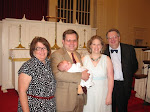
Did you know that New Years was not always celebrated on January 1? According to my research, the celebration of the “new year” is the oldest of all holidays. It actually was first celebrated about 4000 years ago – in the year 2000 BC. The Babylonians celebrated the New Year with the first visible crescent moon – the first day of spring which would be in March. They celebrated the “new year” at this time because to them it made sense - it is the season of rebirth, of planting new crops, and of blooming whereas January 1 had no astronomical or agricultural significance.
The Romans continued the tradition of observing the “new year” in late March. This caused some problems because apparently their calendars had been tampered with by various emperors causing the calendar to soon become out of sync with the sun! In order to straighten up this problem, the Roman senate declared January 1 to be the beginning of the “new year” back in 153 BC.
The tampering continued with the calendar until finally in 46 BC when Julius Caesar established what has become known as the Julian Calendar.
Western nations didn’t start celebrating the “new year” until about 400 years ago. They have many traditions that date back to the Babylonians time, such as making resolutions for the “new year.” The Babylonians most popular resolution was to return borrowed farm equipment while ours today is to lose weight or quit smoking.
The Tournament of Roses Parade, which dates back to 1886, was a way to celebrate the ripening of the orange crop in California.
Although the Rose Bowl football game was first played as a part of the Tournament of Roses in 1902, it was replaced by Roman chariot races the following year. In 1916, the football game returned as the sports centerpiece of the festival.
The tradition of using a baby to signify the “new year” was begun in Greece around 600 BC. It was their tradition at that time to celebrate their god of wine. The early Egyptians also used a baby as a symbol of rebirth.
Although the early Christians denounced the practice of celebrating the “new year “as pagan, the popularity of the baby as a symbol of rebirth caused the Church to reevaluate its position. The Church finally allowed its members to celebrate the “new year” with a baby, which was to symbolize the birth of the baby Jesus. The use of a baby on a New Year’s banner was brought to America by our German ancestors.
We also have traditions of things that might be done that will bring good luck to you and your family. Being in the company of family and friends is thought to bring good luck for you and those who surround you.
Traditional New Year foods are also thought to bring luck. Many cultures believe that anything in the shape of a ring is good luck, because it symbolizes "coming full circle," completing a year's cycle. For that reason, the Dutch believe that eating donuts on New Year's Day will bring good fortune. Many will consume certain food with the belief that good luck will be in their future. Eating foods such as black-eyed peas with hog jowls or ham; cabbage which symbolizes prosperity; and some will consume rice, all of which are considered good luck in many cultures from around the world.
The song, “ Auld Lang Syne,” is traditionally played in the background of most New Year celebrations in English-speaking countries. Did you know that the lyrics were partially written by Robert Burns in the 1700’s and was not published until 1796 after his death. The tune is actually and old Scottish tune that literally means “old long ago,” or simply, “the good old days.”
The lyrics are as follows:
Auld Lang Syne
Should auld acquaintance be forgot,
And never brought to mind?
Should auld acquaintance be forgot,
And auld lang syne?
For auld lang syne, my dear,
For auld lang syne,
We'll tak a cup of kindness yet,
For auld lang syne!
And there's a hand my trusty fiere,
And gie's a hand o thine,
And we'll tak a right guid-willie waught,
For auld lang syne
For auld lang syne, my dear,
For auld lang syne,
We'll tak a cup of kindness yet,
For auld lang syne!
Should auld acquaintance be forgot,
And never brought to mind?
Should auld acquaintance be forgot,
And auld lang syne?
For auld lang syne, my dear,
For auld lang syne,
We'll tak a cup of kindness yet,
For auld lang syne!
And there's a hand my trusty fiere,
And gie's a hand o thine,
And we'll tak a right guid-willie waught,
For auld lang syne
For auld lang syne, my dear,
For auld lang syne,
We'll tak a cup of kindness yet,
For auld lang syne!






No comments:
Post a Comment